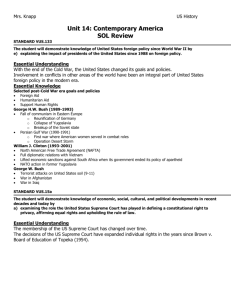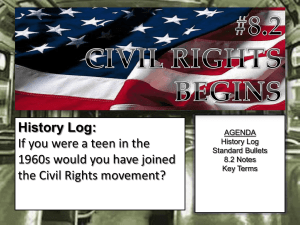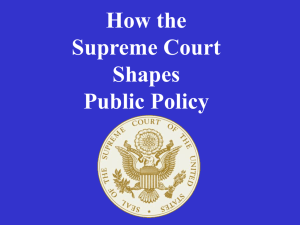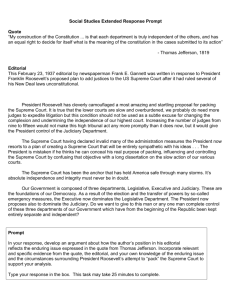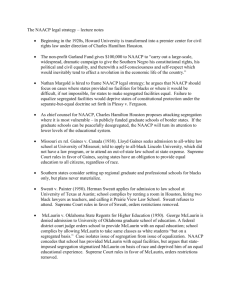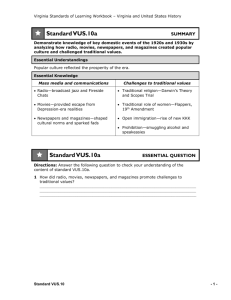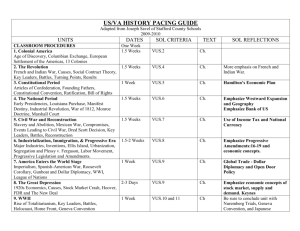US History: Civil Rights, Supreme Court, & Modern America
advertisement
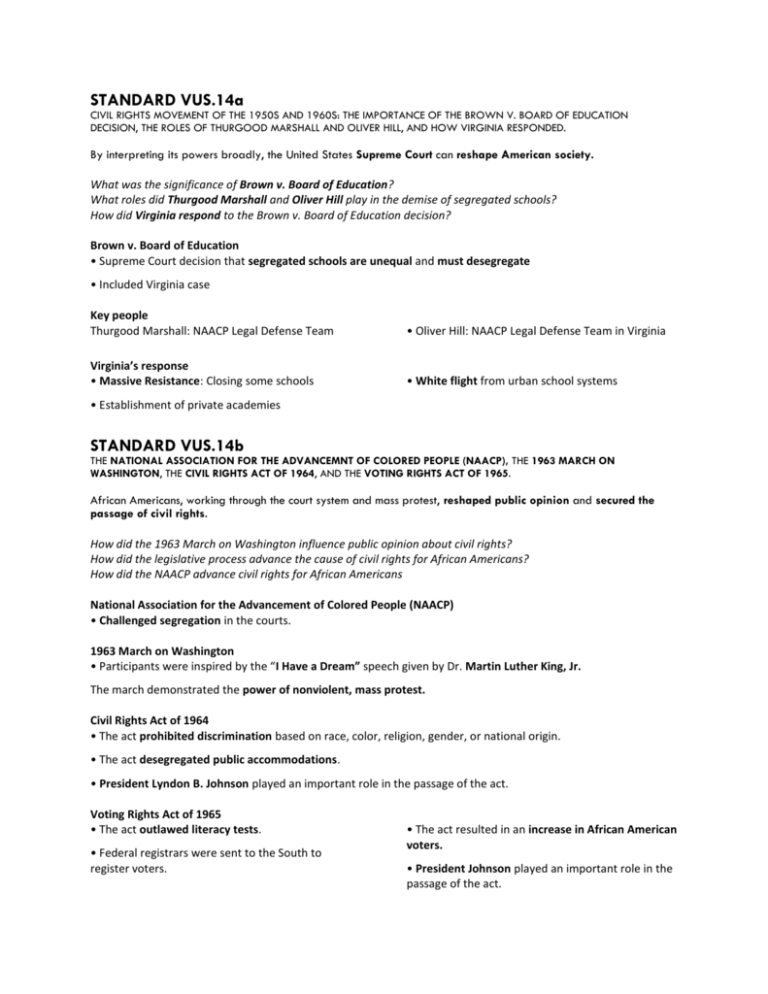
STANDARD VUS.14a CIVIL RIGHTS MOVEMENT OF THE 1950S AND 1960S: THE IMPORTANCE OF THE BROWN V. BOARD OF EDUCATION DECISION, THE ROLES OF THURGOOD MARSHALL AND OLIVER HILL, AND HOW VIRGINIA RESPONDED. By interpreting its powers broadly, the United States Supreme Court can reshape American society. What was the significance of Brown v. Board of Education? What roles did Thurgood Marshall and Oliver Hill play in the demise of segregated schools? How did Virginia respond to the Brown v. Board of Education decision? Brown v. Board of Education • Supreme Court decision that segregated schools are unequal and must desegregate • Included Virginia case Key people Thurgood Marshall: NAACP Legal Defense Team • Oliver Hill: NAACP Legal Defense Team in Virginia Virginia’s response • Massive Resistance: Closing some schools • White flight from urban school systems • Establishment of private academies STANDARD VUS.14b THE NATIONAL ASSOCIATION FOR THE ADVANCEMNT OF COLORED PEOPLE (NAACP), THE 1963 MARCH ON WASHINGTON, THE CIVIL RIGHTS ACT OF 1964, AND THE VOTING RIGHTS ACT OF 1965. African Americans, working through the court system and mass protest, reshaped public opinion and secured the passage of civil rights. How did the 1963 March on Washington influence public opinion about civil rights? How did the legislative process advance the cause of civil rights for African Americans? How did the NAACP advance civil rights for African Americans National Association for the Advancement of Colored People (NAACP) • Challenged segregation in the courts. 1963 March on Washington • Participants were inspired by the “I Have a Dream” speech given by Dr. Martin Luther King, Jr. The march demonstrated the power of nonviolent, mass protest. Civil Rights Act of 1964 • The act prohibited discrimination based on race, color, religion, gender, or national origin. • The act desegregated public accommodations. • President Lyndon B. Johnson played an important role in the passage of the act. Voting Rights Act of 1965 • The act outlawed literacy tests. • Federal registrars were sent to the South to register voters. • The act resulted in an increase in African American voters. • President Johnson played an important role in the passage of the act. STANDARD VUS.15a ECONOMIC, SOCIAL, CULTURAL, AND POLITICAL DEVELOPMENTS IN RECENT DECADES AND TODAY: THE ROLE THE UNITED STATES SUPREME COURT HAS PLAYED IN DEFINIING A CONSTITUTIIONAL RIGHT TO PRIVACY, AFFIRMING EQUAL RIGHTS, AND UPHOLDING THE RULE OF LAW. The membership of the United States Supreme Court has changed to become more diverse over time. The decisions of the United States Supreme Court have expanded individual rights in the years since Brown v. Board of Education of Topeka, Kansas (1954). How has the membership of the United States Supreme Court changed to become more diverse over time? How have the decisions of the United States Supreme Court promoted equality and extended civil liberties? The membership of the United States Supreme Court has included women and minorities, such as Sandra Day O’Connor, Ruth Bader Ginsburg, and Clarence Thomas. The civil rights movement of the 1940s, 1950s, and 1960s provided a model that other groups have used to extend civil rights and promote equal justice. The United States Supreme Court protects the individual rights enumerated in the Constitution of the United States. The United States Supreme Court identifies a constitutional basis for a right to privacy that is protected from government interference. The United States Supreme Court invalidates legislative acts and executive actions that the justices agree exceed the authority granted to government officials by the Constitution of the United States. STANDARD VUS.15b Rising immigration to the United States has increased American diversity and redefined American identity. What factors have drawn immigrants to the United States? What immigrant groups account for the bulk of immigration? What issues are currently being debated related to immigration to the United States? What are some contributions made by immigrants? Immigration to the United States has increased from many diverse countries, especially Asian and Latin American countries. Reasons for immigration Political freedom • Economic opportunity Issues related to immigration policy • Strain on government services • Pathway to citizenship • Filling low-paying jobs in the United States • Bilingual education • Border issues • Increasing cultural diversity Contributions of immigrants Diversity in music, the visual arts, and literature • Roles in the labor force • Achievements in science, engineering, and other fields STANDARD VUS.15c THE MEDIAINFLUENCE ON CONTEMPORARY AMERICAN CULTUREAND HOW SCIENTIFIC AND TECHNOLOGICAL ADVANCES AFFECT THE WORKPLACE, HEALTH CARE, AND EDUCATION Dramatic advances in technology have affected life in America in many significant areas. The American space program was a triumph of American technological prowess. Technology can make communication and information more accessible. How has the accessibility to improved technology and communications affected American culture? In the early 1960s, President Kennedy pledged increased support for the American space program. The race to the moon continued through the 1960s. U.S. astronaut John Glenn was the first American to orbit the Earth. In 1969, American astronaut Neil Armstrong was the first person to step onto the moon’s surface. He proclaimed, “That’s one small step for a man; one giant leap for mankind.” Sally Ride was the first female American astronaut. Over the past three decades, improved technology and media have brought about better access to communication and information for businesses and individuals in both urban and rural areas. As a result, many more Americans have access to global information and viewpoints. Examples of technological advances • Space exploration – Space shuttle – Mars rover • Communications – Satellites – Global positioning system (GPS) – Voyager missions – Hubble telescope – Personal communications devices • Robotics Changes in work, school, and health care in recent decades • Breakthroughs in medical research, including Telecommuting improved medical diagnostic and imaging • Online course work technologies • Growth of service industries • Outsourcing and offshoring STANDARD VUS.15d THE IMPACT OF THE “REAGAN REVOLUTION” ON FEDERALISM, THE ROLE OF GOVERNMENT, AND STATE AND NATIONAL ELECTIONS SINCE 1988 Ronald Reagan’s policies had an impact on the relationship between the federal government and state governments. The conservative political philosophy of President Reagan prompted a reevaluation of the size and role of government in the economy and society of contemporary America. What was the impact of the “Reagan Revolution” on federalism, the role of government, and state and national elections since 1988? President Reagan and conservative Republicans advocated for • tax cuts • reduction in the number and scope of govern strengthening of the American military. • transfer of responsibilities to state governments • appointment of judges/justices who exercised “judicial restraint” The “Reagan Revolution” extended beyond his tenure in office with • the election of his vice president, George H. W. Bush • the election of a centrist Democrat, William J. Clinton • the Republican sweep of congressional elections and statehouses in the 1990s • the election of George W. Bush as president. STANDARD VUS.15e THE ROLE OF GOVERNMENT ACTIONS THAT IMPACT THE ECONOMY The federal government has the ability to influence the United States economy. It bases its decisions on economic indicators such as Gross Domestic Product (GDP), exchange rates, rate of inflation, and unemployment rate. What are the roles that government plays in the United States economy? Government promotes a healthy economy characterized by full employment and low inflation through the actions of • the Federal Reserve: Monetary policy decisions control the supply of money and credit to expand or contract economic growth. • the president and Congress: Fiscal policy decisions determine levels of government taxation and spending; government regulates the economy. STANDARD VUS.15f THE ROLE OF THE UNITED STATES IN A WORLD CONFRONTED BY INTERNATIONAL TERRORISM The United States has confronted the increase in international terrorism by formulating domestic and international policies aimed at stopping terrorism. What role has the United States played in a world confronted by international terrorism? United States responses to terrorism • Heightened security at home (Patriot Act) • Diplomatic
